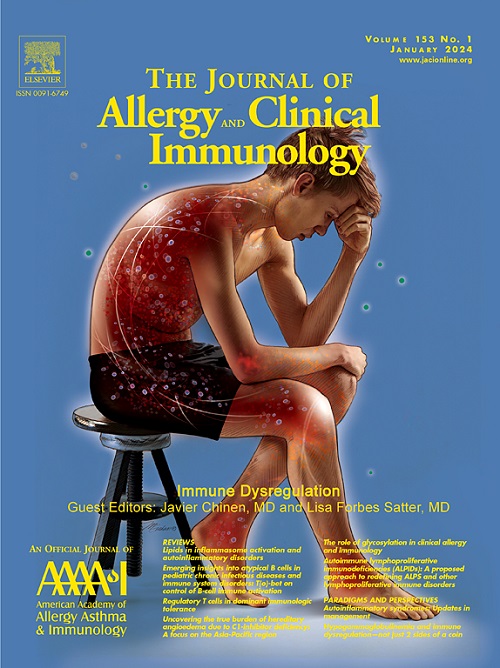Baseline basophil activation and early suppression is associated with clinical outcome after peanut sublingual immunotherapy.
IF 11.4
1区 医学
Q1 ALLERGY
引用次数: 0
Abstract
BACKGROUND Sublingual immunotherapy (SLIT) was recently shown to safely induce desensitization and remission of peanut allergy in 1-to 4-year-old children. OBJECTIVE Basophil activation has been shown to be suppressed in allergen-specific immunotherapy. We aimed to evaluate the timing of basophil suppression during peanut SLIT and its impact on clinical outcomes. METHODS Fifty peanut-allergic children were enrolled in a peanut SLIT trial and randomized to active peanut or placebo SLIT for 36 months followed by a three-month avoidance period to evaluate remission. Blood was collected at baseline, 12, 24, 36, and 39 months to measure basophil activation by CD63 and CD203c. RESULTS For participants on peanut SLIT, basophil activation based on CD63 expression was significantly reduced by 12 months and continued to decrease throughout peanut SLIT, whereas CD63 activation in participants receiving placebo remained unchanged from 0-36 months. CD203c expression remained unchanged for both peanut SLIT and placebo participants throughout the trial. Actively treated participants who achieved remission had lower CD63 expression at baseline and significant suppression of CD63 expression by 12 months, while treatment failures had higher CD63 expression at baseline and lack of suppression by 12 months. Lower basophil activation in those achieving remission, compared to those that failed treatment, remained present for up to 3 years. CONCLUSIONS Following peanut SLIT, participants who achieved remission had significantly suppressed basophils by 12 months, compared to unsuccessful participants that were not desensitized, suggesting that early suppression of basophils may be indicative of peanut SLIT efficacy.基线嗜碱性粒细胞激活和早期抑制与花生舌下免疫治疗后的临床结果相关。
舌下免疫疗法(SLIT)最近被证明可以安全地诱导1至4岁儿童的花生过敏脱敏和缓解。目的:研究表明,在过敏原特异性免疫治疗中,嗜碱性粒细胞的活化受到抑制。我们的目的是评估花生SLIT期间嗜碱性粒细胞抑制的时间及其对临床结果的影响。方法50名花生过敏儿童参加了一项花生SLIT试验,随机分为活性花生或安慰剂SLIT组,为期36个月,随后是3个月的避免期,以评估缓解情况。在基线、12、24、36和39个月采集血液,测量CD63和CD203c对嗜碱性粒细胞的激活。结果:在花生SLIT的参与者中,基于CD63表达的嗜碱性粒细胞激活在12个月内显著降低,并且在整个花生SLIT过程中持续降低,而接受安慰剂的参与者的CD63激活在0-36个月期间保持不变。在整个试验过程中,花生SLIT和安慰剂参与者的CD203c表达保持不变。积极治疗获得缓解的参与者在基线时CD63表达较低,并且在12个月内CD63表达明显抑制,而治疗失败的参与者在基线时CD63表达较高,并且在12个月内缺乏抑制。与治疗失败的患者相比,获得缓解的患者的嗜碱性粒细胞激活水平较低,且持续时间长达3年。结论:花生SLIT治疗后,与未脱敏的患者相比,获得缓解的患者在12个月后显著抑制了嗜碱性细胞,这表明早期抑制嗜碱性细胞可能表明花生SLIT的疗效。
本文章由计算机程序翻译,如有差异,请以英文原文为准。
求助全文
约1分钟内获得全文
求助全文
来源期刊
CiteScore
25.90
自引率
7.70%
发文量
1302
审稿时长
38 days
期刊介绍:
The Journal of Allergy and Clinical Immunology is a prestigious publication that features groundbreaking research in the fields of Allergy, Asthma, and Immunology. This influential journal publishes high-impact research papers that explore various topics, including asthma, food allergy, allergic rhinitis, atopic dermatitis, primary immune deficiencies, occupational and environmental allergy, and other allergic and immunologic diseases. The articles not only report on clinical trials and mechanistic studies but also provide insights into novel therapies, underlying mechanisms, and important discoveries that contribute to our understanding of these diseases. By sharing this valuable information, the journal aims to enhance the diagnosis and management of patients in the future.

 求助内容:
求助内容: 应助结果提醒方式:
应助结果提醒方式:


